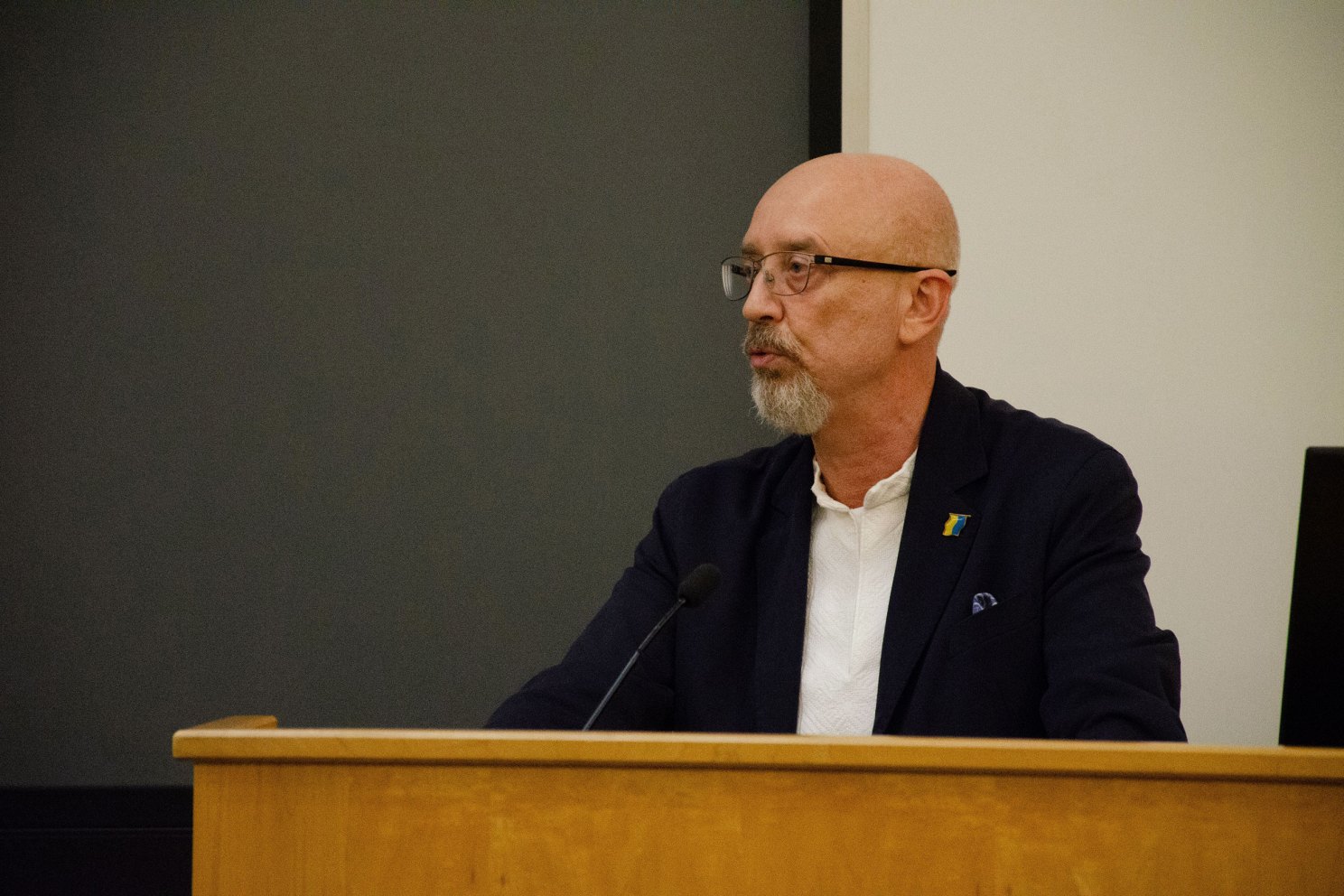Key to negotiated peace in Ukraine? Having the West keep Russia honest.
Former defense minister says U.S., allies need to continue financial, arms aid, remove curbs on missiles to bring Putin to table

Oleksii Reznikov.
Credit: Ukrainian Research Institute
There is a path forward to peace in Ukraine, according to the country’s former minister of defense. But it will require concrete, mutually agreed-upon terms with Russia, backed up by support from the U.S. and allies to ensure Moscow doesn’t renege.
Oleksii Reznikov, who served as Ukraine’s minister of defense from 2021 to 2023, paid a visit to the Ukrainian Research Institute on Oct. 16 to discuss the possibility of negotiated peace in the ongoing Russo-Ukrainian war.
The discussion was moderated by Mariana Budjeryn, a senior research associate with the Project on Managing the Atom (MTA) at the Harvard Kennedy School’s Belfer Center. It touched on Ukraine’s requests for more weapons from the U.S. and its allies, the possibility of full NATO membership, and the need for shows of iron-clad Western support as a prod to bring Russia to the table for talks to end to the almost three-year war.
“Crushing Putin’s regime on the battlefield is the best way to launch the transformation of Russia, and that is possible. Ukraine has proven as much.”
Oleksii Reznikov
“Crushing Putin’s regime on the battlefield is the best way to launch the transformation of Russia, and that is possible. Ukraine has proven as much,” Reznikov said. “All we need is the sufficient and timely support without six-month pauses — I mean decision in Congress — and without limitation on how weapons are used.”
The U.S. has thus far restricted the use of long-range missiles it has supplied to Ukraine, which wants to strike targets deep in Russian territory. Russian President Vladimir Putin has warned that he would consider any such attack to be an act of war by the allies.
The U.S. has continued to provide financial and weapons aid to Ukraine throughout the conflict, most recently in the form of a $425 million security package. However, Reznikov said, Russia continues to dominate Ukraine with the number and sophistication of their weapons, along with disinformation campaigns.
“We need a lot of weapons and trained personnel if you don’t want your people to lose lives,” he said. “This is one of the last, if not the last, war where you will see large manpower in direct conduct. War is increasingly turning into a competition between robotic systems as well as automated control systems.”
Reznikov also mentioned Russia’s use of deep fakes, AI, and cyberattacks to spread propaganda and disinformation.
“We have the experience of defending a democratic country against a strong and highly technological army of an autocratic regime,” he said. “The main challenge is the timely recognition of threats when the enemy is actively employing hybrid sub-threshold acts of aggression and is weaponizing everything from freedom of speech to migration streams, food logistic chains, freedom of navigation in a Black Sea, Caspian Sea, etc.”
And if the two countries get to the negotiating table, Reznikov said there must be two basic components if the talks are to be a success: trust and guarantees, backed by threat of enforcement.
Ukraine has had bad experiences when it comes to trust, he said. For example, the 1994 Budapest memorandum with Russia, the U.S., and the U.K. required Ukraine to give up its then-sizable nuclear arsenal (left behind during the breakup of the Soviet Union) in exchange for security guarantees from the three nations.
“We have given up the third-largest nuclear arsenal in the world, our strategic aviation, and the missiles [once part of Ukraine’s nuclear arsenal, now converted to conventional arms] that Russia is now using to kill our children and women in the cities, far from the front,” Reznikov said. “One of the guarantors of our security, Russia, openly attacked us in 2014 and others stood by and did nothing.”
But “there are also success stories,” he said, of long-running hostilities ended through negotiation.
Reznikov points to the Good Friday agreement between the U.K. and Ireland as an example. The accord ended more than 30 years of conflict between the states and helped develop the current system of government operating in Northern Ireland today.
“It was not easy, and it didn’t solve every problem, but it allowed the parties to proceed past a stalemate and to overcome some obstacles,” Reznikov said. “There was a trust. There were guarantees, and there was a model of coexistence.”
In the case of Russia and Ukraine, Reznikov believes the two countries will need allies on either side of the table to ensure guarantees. One option would be membership in NATO for Ukraine, assuring protection by Western allies against future aggression.
“Another option is a bi- or multilateral deal, detailing direct obligations to support Ukraine, should Russia violate its side of the deal,” he said. “Not promises to hold consultations, but concrete steps, weapons, financial support, closing the sky with the air defenses, crushing sanctions against Russia, etc.”
Without the backing of other countries, Russia will continue to be a source of instability within the region, Reznikov said.
He also noted that concerns by the West over Putin’s thinly veiled threats of nuclear attacks over Ukraine areoverblown.
“Russia is developing policies to increase policies and increase the work force. It is not planning to die in nuclear ashes,” he said. “The moment they encounter resistance, they stop and back down. Therefore, the free world needs to set its anxieties aside.”




